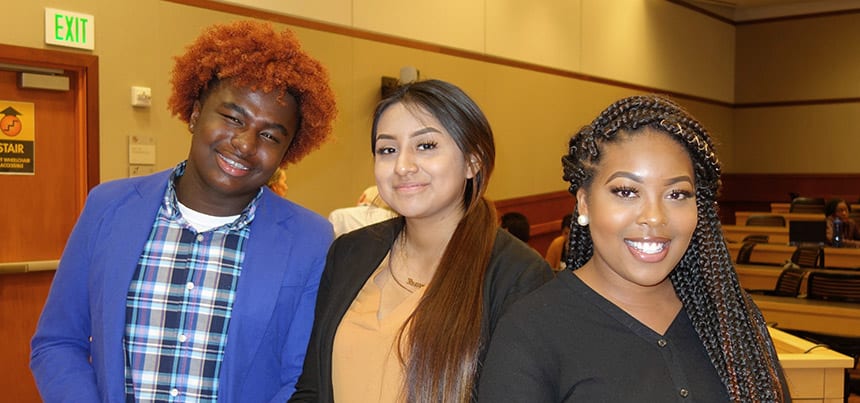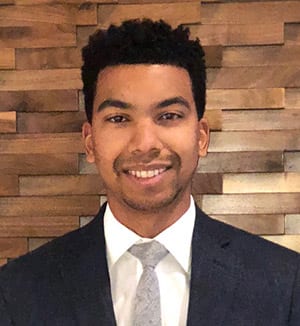
By Andrew Cohen
Just a sophomore at Oakland’s Castlemont High school, Roxanna Amador was close to giving up. Overwhelmed by the violence in her neighborhood, personal issues, and family struggles, she saw no way out.
“I started to believe I messed up bad enough already my freshman and sophomore year that there was no point in trying and it was too late to change,” she says. “I thought I wouldn’t be eligible for good scholarships to go to college and I for sure couldn’t afford it. As much as I tried, I couldn’t find it within me to keep pushing.”
Friday night, just a few months removed from that space, Amador struck a far different note in her Center for Youth Development through Law (CYDL) program graduation speech. The program, which serves area high school students from disadvantaged backgrounds, provides paid law-related internships and classes at Berkeley Law that integrate a legal curriculum with life and leadership skills.
“I gained important knowledge, great connections, hands-on experience in an office and court setting, confidence, and motivation,” Amador said. “Before the program, I had no idea what I wanted to do or how I was going to attend college and with what money. Now, I have goals that I will try so hard to reach.”
In addition to hosting CYDL’s classes and two mock trials, Berkeley Law is involved at every level of the program. Alumni serve on the board of directors and as mock trial judges, Dean Erwin Chemerinsky and Professor David Oppenheimer gave talks to the students, and Professor Catherine Albiston ’93 is the faculty advisor.
Role model instructors

Rising 2L Dwight Bibbs co-led a “Street Law” presentation and discussed college and law school. He informed this year’s 32 CYDL students about their rights when interacting with police officers, shared his experiences growing up, and fielded questions.
His parents broke “the cycle of systemic poverty that’s plagued my family and continues to hinder so many communities of color in our country,” Bibbs says. “As a result, I’ve always felt an obligation to share my story … to offer relatable, tangible examples of people from similar communities who used academics to better their situations and that of their families.”
Dorian Peters feels a similar obligation. A CYDL participant in 2000, Peters was a program instructor this summer, focusing on constitutional issues. He went to UC Berkeley and Vanderbilt Law School, spent 4½ years as a prosecutor, and 4½ more as a criminal defense attorney.
Now a police officer in El Cerrito, Peters is a California State Bar certified specialist in criminal law and serves on the Contra Costa County Bar Association’s board of directors.
“I wanted to give back to the program because I felt it gave me exposure to the legal field and to a professional work environment,” he says. “After CYDL, I could see myself becoming a lawyer and that became my career goal. I wanted to be able to pass that gift along to the next generation of students.”
Representation through participation
Peters also wanted to help diversify the legal profession. He notes that while the criminal justice system mostly affects minorities, in some cities it is uncommon to see a minority lawyer, police officer, or judge.
“There’s a long history of distrust between people of color and law enforcement in some communities,” Peters says. “Diversity in the criminal justice system … helps bring different perspectives to the table and helps the system address issues that affect the whole community, including those specific to people of color.”
CYDL students spent four days a week at their internships and the other day in classroom sessions at Berkeley Law. Amador interned at the Public Defender’s Office of Alameda County, where she scanned files, helped organize materials for a homicide case, went to court with lawyers, and attended three trials.
That experience fueled a her new plan: attend community college, transfer to a UC school for her bachelor’s degree, go to law school, and become an attorney.
“Seeing this real-life example of lawyers’ tasks and clients’ cases really opened my eyes,” Amador says. “I don’t want to be a client, I want to have clients.”
Creating a pipeline
Bibbs was impressed with Amador and her peers, saying they were “incredibly bright, asked thoughtful questions, and were really knowledgeable about current events and the current state of our politics.”
Since CYDL launched in 1999, more than 92 percent of participants have enrolled in higher education. In addition to honing critical thinking and communication skills, Director Nancy Schiff enlists college advisors and financial aid experts to give students a concrete roadmap to college.
“The program helps them believe they can succeed in college and beyond, no matter their family or financial situation,” Schiff says. “We try to create a mentorship community that will support these students throughout high school and long after.”
That effort includes securing instructors like Peters and Bibbs, who grew up in similar circumstances and provide students of color access to people who keenly relate to their situations.
As Bibbs notes, most CYDL students “do not have family members or friends who are lawyers or pursuing legal degrees. Exposure to relatable people involved in the legal profession makes becoming a lawyer seem more attainable … which is the first step to encouraging students to pursue legal careers in the first place.”